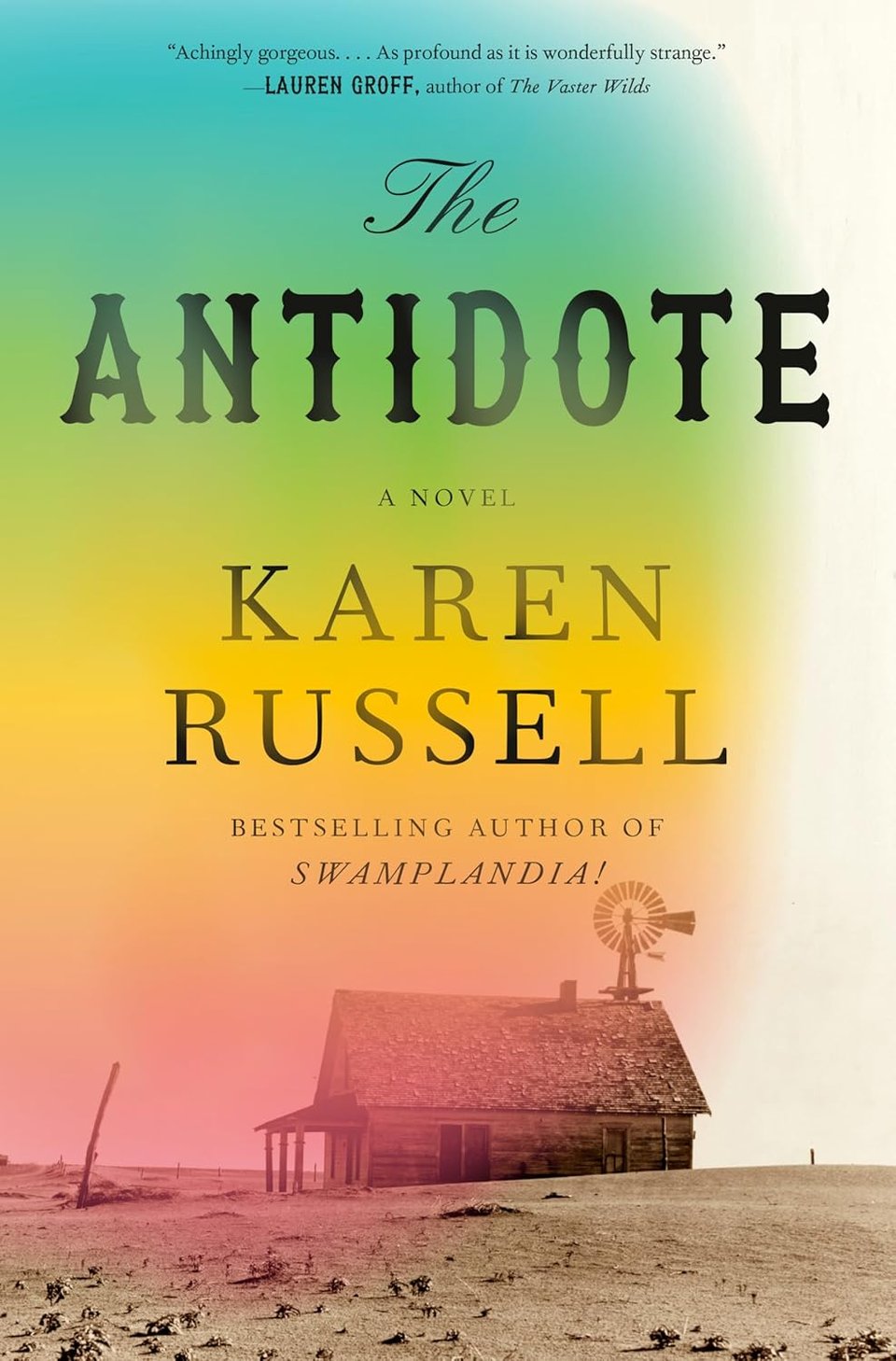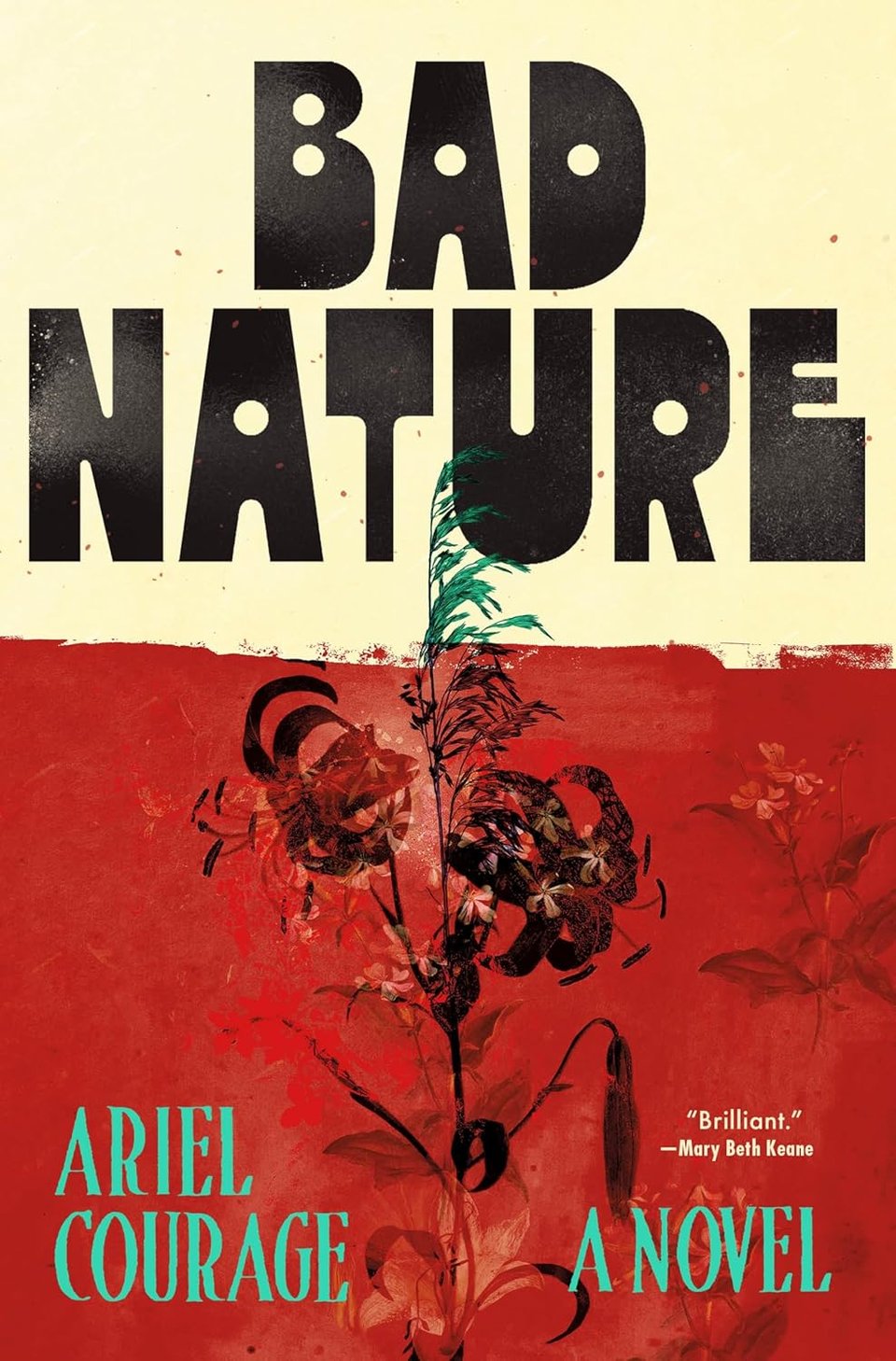In Brief: "The Antidote," "Bad Nature"
Reviews of "The Antidote," by Karen Russell, and "Bad Nature," by Ariel Courage.
This newsletter is free to the public, and appears infrequently due to my chronic illnesses. If you would like to support me, you can subscribe to my podcast's Patreon here. Although I'm on leave, this still helps. Otherwise, feel free to send me a couple bucks through Ko-fi.

The Antidote, Karen Russell (Knopf)
The Antidote was the first novel I read by Karen Russell, a literary wunderkind of the early 2010s (her previous novel, Swamplandia!, was infamously one of the Pulitzer finalists the year the board decided to not give out a prize). For much of the novel, I was enchanted by her prose and by the conceit of this new book. Set in the fictional town of Uz, Nebraska, during the Dust Bowl, it features a large cast of characters but focuses primarily on the titular Antidote, a “vault” who can collect memories from customers. After they make a deposit, they forget their (usually painful) memory, the “vault” doesn’t remember it either, and they can come back to collect at any time (using a deposit slip—the bank metaphor is not subtle). At the beginning of the book, a storm leaves The Antidote bust, along with other vaults in the area; suddenly, she has to figure out what to do about the fact that she’s lost the memories of everyone in this small town. Everyone is starving and there’s a corrupt sheriff (as you’d expect in a tale of the old west), so trouble is afoot.
The other central character is a teenage girl named Dell, who’s recently moved in with her uncle after her mother was murdered. Dell’s main passion in life is her basketball team, and winning the state (district? regional? I don’t have the book to fact check) championships. She and her teammates are irresistibly winning, focusing on this task to avoid thinking about drought, famine, and in Dell’s case her mother’s death. To raise money for her team, she winds up apprenticing with The Antidote, and making up fake memories for customers who come to collect.
There are structural and plot problems with the second half of the book that I don’t have time to get into here. The biggest problem with The Antidote, though, is that Russell is not content to tell a story about these particular characters at this particular historical moment, but instead wants to make a larger comment on American history, specifically the exploitation and genocide of indigenous people. This leads to a number of scenes were white second-generation settlers opine about the horrors of said genocide, which is both ahistorical in general and particularly implausible given how little the starving Dust Bowlers of the 1930s would have wanted to hear about what they had done to victimize others: again, they were starving and being driven from their homes. Of course they had settled land that wasn’t theirs, a generation or two before, but I think it takes more presence of mind than most people have to reflect on this when you have no food or money to survive. Also, hardly anybody in these communities would have been talking about this then anyway—because they were so racist!
There is also a Black character in the book, a female photographer sent to document the country via one of the WPA projects (historically implausible in the first place; Gordon Parks had this job but it’s hard to imagine them sending out a Black woman), who faces almost no racism in Uz and is warmly welcomed by Dell’s family. (There are hardly any Native characters in the book, meanwhile, which means Russell writes a lot about white characters pontificating about how they have been mistreated to tackle the issue… not a strategy I endorse.)
As I read this book I found myself thinking: what is the point of writing historical fiction like this? In recent years, I’ve read book after book by white authors in which white characters are magically sympathetic to the marginalized. POC authors strangely do not seem to suffer from this problem. I recently read Kerri K. Greenidge’s excellent biography The Grimkes, about the white Grimke abolitionists and their Black relatives (the product of their slaver brother raping a Black woman he owned, or “owned”) and I was simply dazzled by the racism these supposedly virtuous white ladies displayed toward their Black relatives. My point being: in most cases, even “good” white people in the past had these prejudices. It’s possible to write a character like this, not necessarily a villain but a complex person who reflects the historical reality of their time. This shows much more respect to the lived experiences of Black, Native, and other POC people who actually had to deal with these white people and the systems of power they enabled. Also, it makes for more interesting storytelling. Because it’s real!

Bad Nature, Ariel Courage (Holt)
Thanks to taking a peek at the acknowledgments page, I realized partway through reading Bad Nature that Ariel and I had crossed paths at Barnard years ago. (I don’t remember this well; I didn’t have a big social circle and wasn’t active in campus life.) But I was tickled to discover this distant connection, partly because I’m always happy to come across other Barnard grads and partly because I was so impressed by this book, which I read at great speed.
After receiving a terminal breast cancer diagnosis, Hester, the narrator, blows up her life and sets out on a road trip to finally kill her abusive father, from whom she’s been estranged for many years. (Her mother, whom she still idolizes, died young when Hester was in high school.) Hester’s first-person narration is the chief appeal of this book: she is delightfully uninterested in conventional morals and, with limited time to live, lets herself stray even further from conventional behavior. She rejects treatment and proceeds to drop in on an old boyfriend and friend whom she hasn’t seen in years, unnerving them both. She propositions a cop to get out of trouble. She dumps large amounts of money on things when she feels like it (her generous lawyer’s salary is now pretty useless, or will be soon). And most importantly, she picks up John, a hitchhiker who is documenting environmental waste sites around the country. John, who comes from a religious family and is now deeply religious about his environmental work (and about living out of a backpack), is about as different from Hester as it’s possible to be. The strange chemistry between them, and their brilliantly written conversations, drive the book.
But I was most interested in how Courage wrote about cancer. Though Hester knows she will die, she is also in denial in some ways; as her breast becomes increasingly damaged, she simply bandages it and pretends nothing is happening. That is to say, this is not a book full of endless reflections on the nature of cancer or the experience of having cancer. It is also not sentimental about the illness. Ever since one of my best friends got a different form of cancer several years ago, I have become highly vigilant about the depiction of cancer in fiction. All too often, cancer is used as manipulative plot device or as a treacly metaphor (now I realize I really want to live! and so on).
There’s a way to read Hester’s cancer as a punishment for her unrelenting and poisonous obsession with her father in Bad Nature. This interpretation is definitely alive in the text to some degree; each reader will have to decide what they think Courage intends (or maybe better said, what the book says to them). I don’t love this interpretation, for probably obvious reasons: illness, as Susan Sontag famously said, is not a metaphor. There is also the obvious connection between Hester’s dying body and John’s work documenting our dying—polluted—earth. I’m not sure I love this interpretation either.
But as I read the book I found myself responding more to the lack of sentimentality around Hester’s cancer. Though these metaphors lurk in the background of the novel, Hester’s voice is the novel’s primary delivery system, if you will, and to her, her cancer is just—there. A rotting thing in her breast. A practical ticking clock. Her cancer is not teaching her a lesson about life. She does not even seem that sad about it. Her story is not sad tragedy about youth cut down in its prime. Cancer is a practical reality that Hester, like many others, face; Hester, unlike most others, doesn’t much care about anything except revenge. As she makes her slow way across the country, from New York to California, she begins to wonder if she’s losing her will. This is a metaphor I can get behind: does her unconscious want the same things her conscious mind wants? Or is it rebelling against her, like the cancer is rebelling against her physical body?
I’ll leave it to you to discover what happens on this quest, and I hope we get more books that treat cancer with this level of pragmatism and lack of sentiment in the future.